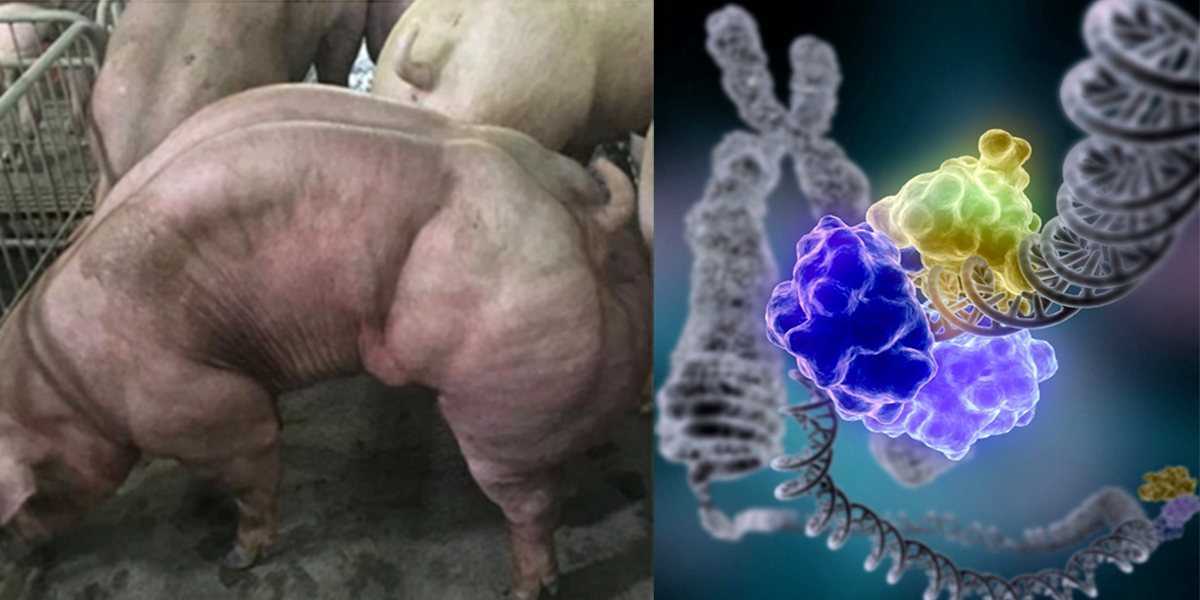
GM super-muscled pigs could hit supermarket shelves soon
Australia's Office of the Gene Technology Regulator (OGTR) has announced changes to the country's Gene Technology Regulations that will allow a raft of new GM animals, plants, and microbes to enter the environment and food chain with no safety assessment and potentially no labelling.
These include super-muscled pigs, non-browning mushrooms, and wheat with powdery mildew resistance. The OGTR's attempt at deregulation comes as studies show that these new GM techniques are not as safe as claimed.
Louise Sales, coordinator of Friends of the Earth’s Emerging Tech Project, said, “Australia is the first country in the world to deregulate the use of CRISPR and other gene editing techniques in animals – raising serious environmental, animal welfare and food safety concerns. Deregulation also poses major risks to our food export that need to be fully assessed.
“A growing body of evidence shows the new GM techniques are not as precise and safe as industry scientists claim. It is vital that GM animals, plants and microbes produced in this way are assessed for safety before being released into our environment and our food supply.”
“We are deeply concerned that the OGTR failed to revisit its claim that these GM techniques result in no greater risk than natural mutations – when the science is showing us just the opposite.
“In July 2018, the European Union’s top court ruled that gene editing techniques such as CRISPR pose similar risks to older GM techniques and need to be assessed for safety in the same way. Our key agricultural competitor New Zealand will also regulate these techniques as GM, potentially disrupting Trans-Tasman trade.”
The OGTR's proposal has not yet entered into force as it still has to be approved by the next parliament after the upcoming general election in May this year. There is a possibility that a new government could reject the proposal.
Dishonest announcement
The Australian government's media announcement of the intended deregulation is a masterpiece of deception. It says the changes will make the "legal position of genome editing clearer" and thus will "benefit cancer patients and medical research".
Nowhere does it mention the effects of the changes on food crops and livestock animals.
This is dishonest because gene therapy medicines, as well as medical drugs produced with GMOs and treatments based on these products, are regulated differently from GMOs created for agriculture and food purposes and must comply with specific laws. Medical GMO products are subjected not only to extensive pre-clinical efficacy testing but also a strict and safety-conscious regulatory system, including multiple phases of clinical trials before a product is considered for market approval.
The same precautionary checks will continue to be applied to gene editing-based products and procedures before any treatment can be given to a human patient. Even after a product is approved for routine clinical use, the effects will be carefully monitored. Also, unlike an unlabelled food, medical treatments can only be given to patients with their informed consent.
This is true in Australia, the EU, the US, and all industrialised countries we have investigated.
Also, in the medical research community, contrary to the agricultural GMO community, there is no pretence that gene editing is totally precise with no unwanted off-target DNA damage, or that it does not give rise to GMOs. The medical research culture is far more safety conscious.
Yet in Australia, with the proposed new changes to the laws governing gene editing, agricultural GMO companies will be able to unleash untested gene edited crops and livestock animals into the food supply and general environment without safety checks and potentially without labelling. That will pose risks to human and animal health and the environment, as well as jeopardising farmer and consumer choice.
European policy-makers should not be deceived
Claire Robinson, editor of GMWatch, commented, "European policy-makers must be careful not to have the wool pulled over their eyes with promises of better cancer and other medical treatments if they relax the regulations on gene edited foods and crops.
"Medical research proceeds separately from agricultural GMO research and development and is subject to its own safety regime. De-regulating gene edited crops and livestock, or relaxing Europe's GMO rules to allow them easier market access, will not speed up access to medical treatments for sick people.
"It is a sad indictment of the agricultural GMO industry's failure to persuade the public and farmers of the safety and value of their products that they are trying to slip them into the food supply under the radar in a secretive, unaccountable, and irresponsible way."
Ignoring biosafety experts
Several Institutional Biosafety Committees opposed the proposed deregulation of the new GM techniques on safety grounds, including the Walter and Eliza Hall Institute of Medical Research Institutional Biosafety Committee (IBC), Victoria University IBC, Children’s Medical Research Institute and Children’s Hospital Westmead IBC, and the University of Woollongong IBC.
Ms Sales commented, “We are concerned that the Office of the Gene Technology Regulator has ignored the advice of so many biosafety experts, instead relying on advice from scientists from institutions with clear commercial conflicts of interest and partnerships with Monsanto, when making its recommendations.
“These techniques are quite clearly genetic engineering. The fact that the OGTR is even considering not regulating them shows how captured it has become by biotechnology industry interests."
The Department of Agriculture and Water Resources has refused to release the advice it gave to Legislative and Governance Forum on Gene Technology on the likely trade impacts of deregulating the new techniques. When asked in Senate Estimates about the potential market risks of deregulation, Daryl Quinlivan, Secretary of the Department of Agriculture and Water Resources, said it is an issue “producers and exporters will have to work out”.[1]
Notes
[1] Commonwealth of Australia (2019) Proof Committee Hansard Senate Estimates Hearing: Rural & Regional Affairs & Transport Legislative Committee: Estimates, February 19 2019, p. 15. https://parlinfo.aph.gov.au/parlInfo/download/committees/estimate/e178d2ee-0936-4e22-b734-5719139e516a/toc_pdf/Rural%20and%20Regional%20Affairs%20and%20Transport%20Legislation%20Committee_2019_02_19_6944.pdf;fileType=application%2Fpdf#search=%22committees/estimate/e178d2ee-0936-4e22-b734-5719139e516a/0000%22